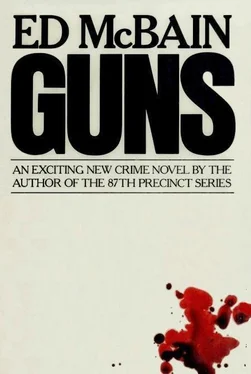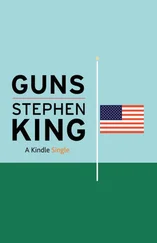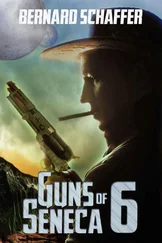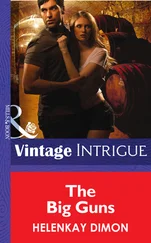Colley leaves the room at once, coming down the carpeted steps into the carpeted hallway. He cannot go out through the kitchen again because he told the black woman he was going to take a swim, and you don’t take a swim in white slacks and a blue-and-green polyester and cotton long-sleeved sports shirt. He wishes he could wait for the woman in the orange beach coat to come out of the bathroom to chat with him. He would love to chat with a woman who calls a toilet a loo, and a piss a tinkle. He wonders if the blonde in the white string bikini talks like that. He finds what he thinks must be the front door of the house, and he opens it and steps out onto an oval gravel driveway.
There is a pale-blue Cadillac sitting right in front of the house, the engine running. A woman is getting out of the car on Colley’s side, and a man is getting out on the driver’s side. A kid in blue jeans and a striped T-shirt is holding the door open for the woman. She smiles at Colley as she gets out of the car. He smiles back nervously. The man comes around the car and says “Hi” to Colley, and Colley says “Hi” back. The kid in the blue jeans says, “Be with you in a minute, sir,” and the man says to Colley, “Roger Lewis,” and sticks out his hand. “Steve Casatelli,” Colley says, and shakes hands with the man. “My wife Adrienne,” the man says. “Nice to see you,” the woman says. They both nod and smile and then go into the house without ringing the doorbell. Colley starts walking up the driveway.
The kid is parking the blue Cad on the road that runs past the house. There are a half-dozen cars parked in the oval driveway, and another dozen or more on the road. Colley figures he can drive away from here in style if he is willing to add a grand-larceny auto to what the cops already have on him. Counting the diner this morning, they have him on two separate counts of armed robbery, one in New York, the other in Jersey, and they have him on what they will probably call murder one, though it was actually self-defense, and they also have him on assault one in New Jersey, for shooting the cook who came at him with the cleaver, though that was self-defense too. So he figures adding the grand-larceny auto to all the rest isn’t going to make a hell of a difference, one way or the other. He has the feeling, in fact, that since nine o’clock last night, when he returned that cop’s fire and shot him dead in self-defense; since that minute and that second, nothing he’s done and nothing he’s about to do is going to change the situation in the slightest. He isn’t particularly worried about this, he figures Que sera, sera. So he continues walking up the driveway, knowing he is going to steal a car. When he was a member of the Orioles, they used to steal cars all the time, but only for joy-riding, dump them in the city someplace after they were done with them. It was easy stealing cars back in those days, but not as easy as it is going to be today. Today he is going to be handed the car of his choice on a silver platter. The kid is running up the driveway to meet him. “Yes, sir,” he says, “which one is it again?”
“The brown Mercedes,” Colley says.
The kid frowns, looks at him as if he’s wondering if this is the same guy who drove up in the brown Mercedes. But Colley stares him down, and the kid turns and runs to where the Mercedes is parked right at the head of the driveway. By the time Colley reaches the big brick pillars flanking the drive, the kid has the car started and is standing outside it, holding the door open on the driver’s side. The kid still looks puzzled. He is probably certain now that Colley isn’t the man who drove up in this car, and he is probably also beginning to wonder if Colley is the man who was earlier wearing the white slacks and the polyester shirt. But Colley hands the kid a buck, and the kid says, “Thank you, sir,” and smiles, and keeps holding the door open until Colley is inside and fastening the seat belt. He closes the door then and stands back a few feet, watching Colley as he eases the car out into the road.
The car smells of real leather. It is a rich smell, he luxuriates in it. He has not driven a car since he got out of prison. He began breaking parole a month and four days after his release from Sing Sing, but the one thing he has not done in that time is drive an automobile because he does not want to get stopped by a cop on a traffic violation and be unable to show him a driver’s license. The car he is driving now is a 280SL, a ’63 or a ’64, he’s not sure which, but a discontinued model either way. Probably cost eight or nine thousand dollars new, bucket seats in beige leather, stick shift on the floor, AM/FM radio — he turns on the radio now, stabbing at one of the buttons and getting a rock station, and then pushing in another button and getting a station playing an opera. He remembers his grandfather going to the opera in Brooklyn all the time. The car has a convertible top, he is tempted to lower the top and drive along with the wind in his crew cut and the sounds of the opera flooding the countryside. It is a beautiful countryside he drives through. He forgets for the moment that he is running from the law. He feels instead that he is out for a late-afternoon drive. He looks at his watch, sees that it is still four o’clock, and remembers that it’s stopped. The dashboard clock reads 6:10.
In a little while it will be dark.
He desperately needs a gun.
Before this he has used guns only aggressively, to force people into doing things he wanted them to do, to force people into giving him things he wanted from them. Now, at 7:48 p.m. on the dashboard clock, he wants a gun only for defense. He is afraid that something terrible is going to happen to him if he does not get his hands on a gun soon. He knows that there are probably two very angry people back there at the pool party, the one whose clothes he stole and the one whose car he stole — unless they are one and the same person. He knows the police have undoubtedly been called by now, and he knows they are probably looking for the stolen car this very minute, but he is reluctant to get rid of it until he has a gun.
All that remains of the afternoon sun is a thin line of vibrant purple behind the silhouetted hills. As he drives northward and eastward, the sky and the hills blend into one. There is a moon, a slender silver slice hanging against the blackness. His headlights have meaning now, they pierce the darkness ahead, picking out shops, and roadside stands, and gasoline stations, all of them closed — this is Sunday. He glances at the fuel gauge. The tank is a quarter full. In the glare of the headlights he sees a phone booth on the side of the road, and he pulls in alongside it, and then steps out of the car and walks quickly to the license plate at the rear. The plate is a Jersey plate, pale yellow and black, the police undoubtedly have the number. There is a clean pressed handkerchief in the hip pocket of the slacks he stole, and he takes that out now and tents it over his hand and gingerly unscrews the bulb illuminating the license plate. He throws the bulb aside, and then steps into the phone booth.
If this was New York City, there’d be no telephone directory in the booth. Also, the phone wouldn’t be working. Also, somebody would have pissed on the floor. But this is Jersey, and when he closes the door of the booth the light comes on, and there’s a directory on the end of a chain and the booth is clean and he figures if he wanted to make a phone call, he would stand a very good chance here in this booth. In New York City the odds are thirty-to-one you will never get to make a phone call from a public booth. It is nice of the police to have a special number to call when you want to report a crime. Trouble is, you go into a booth the phone is always out of order. Colley sometimes thinks there is a bunch of guys just like himself running all over New York City fucking up the phones. So if later they’re committing a robbery or a burglary or mugging an old lady in the street, nobody can pick up the phone and dial 911.
Читать дальше










